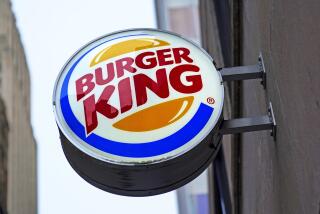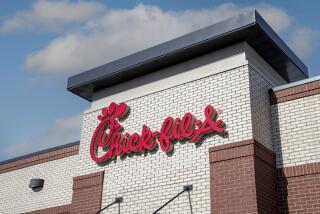The Virtues of Being Contrarian
- Share via
In the battle for consumers’ money and attention, being the black sheep in a flock of competitors can be a very good thing.
This is the tactic Doug Levine, founder of Crunch gyms, took when he was confronted with the challenge of getting the nation’s couch potatoes to rise up from their sofas and visit his gyms.
Six years ago, when he first tackled this problem, the airwaves were ablaze with look-alike fitness center ads showing tight-bunned, washboard-ab’d models working out. Nobody would pay attention to another shirtless-guy or scantily clad-girl gym ad, he said.
So Levine took a contrarian approach. He positioned Crunch gyms as a safe, offbeat alternative to the nation’s often intimidating muscle-and-fitness body shops.
Adopting the slogan “No Judgments,” Crunch ran a series of ads featuring actors in bunny and penguin suits playing sports and musing about their individuality.
Crunch also initiated a series of campy group exercise classes that seemed to parody the no-nonsense “pump till you drop” workouts of rivals: “gospel aerobics,” “firefighter workouts” (where exercisers lugged fire equipment through obstacle courses to screaming sirens and taped 911 calls); belly-dancing “goddess workouts,” “ballet boot camp” and “circus training” (in which participants performed Chinese kicks, headstands, tumbles, crab walks and juggling to calliope music).
Other gyms’ “message was, ‘If you want to look like this, come in and see us,’ ” Levine said.
Today, attracting the attention of a nation of channel surfers is as difficult as working out in a penguin suit.
“Simply saying you’re better is not going to cut it in today’s marketplace,” said Robin Fisher Roffer, a Los Angeles-based brand strategist and president of Big Fish Marketing.
Companies are increasingly being pressed to come up with branding strategies that can establish memorable identities. Some companies attempt this by challenging industry standards, opposing established leaders in their field and defying public expectations.
According to Steve McKee, president of advertising agency McKee Wallwork Henderson in Albuquerque, N.M., there are four ways to do this: by being contrarian in their pricing strategies, distribution tactics, product approaches or promotion campaigns.
“There’s never a time when you don’t want to be as different as you possibly can be,” McKee said.
Companies that have succeeded in their gambits have earned niches in the public psyche.
In the 1960s, when auto makers celebrated big and beautiful, Volkswagen took a radically different approach. “Think small,” it proposed in its award-winning ads. One showed a photo of the lunar module accompanied by the tagline, “It’s ugly but it gets you there.”
When an industry is dominated by a Goliath, its foes shouldn’t play “follow the leader” by aping its strengths or claiming superiority over it, warned marketing expert Al Ries, coauthor of “The 22 Immutable Laws of Branding: How to Build a Product or Service into a World-Class Brand” (HarperBusiness, 1998). Yet, according to Ries, this is what companies typically do.
Instead, they should scrutinize their Goliath’s weaknesses and demonstrate how they’re different, Ries said.
For example, when studies in the 1950s showed that aspirin ingestion could be associated with stomach bleeding, Tylenol quickly positioned itself as the safe alternative “for the millions who should not take aspirin,” Ries said.
“To get people to understand this concept is something I find very difficult,” Ries said. “But I tell them, ‘You have to realize that you can’t, in the public’s perception, build a better watch than Rolex or have a better car service than Hertz.”
Avis Rent a Car System Inc. figured this out nearly 35 years ago, when it chose to abstain from a “who’s better” war against industry leader Hertz.
Instead, it created an ad campaign touting its commitment to customer service and its promise of continual improvement.
The result was one of the most famous advertising campaigns of all time: “We Are No. 2. We try harder.”
These days, Atlanta-based EarthLink, the third-place Internet service provider, is hoping to take a similar tack against industry leader America Online. Battling the giant, which in 2000 had more than 25 million subscribers, compared with EarthLink’s 4.6 million, isn’t going to be easy, said Claudia Caplan, EarthLink’s vice president of brand marketing, who heads up the efforts.
But she said it’s important for EarthLink’s strategists to analyze what they perceive as AOL’s weaknesses--reported privacy lapses, spam, multiple advertising and announcement screens and prepackaged content--and create a campaign introducing a vastly different EarthLink experience.
“We can’t afford to surf in the wake of AOL,” Caplan said. “We wanted to take a broader, more emotional view of ourselves as the No. 1 provider of the real Internet, as opposed to AOL’s walled garden.”
EarthLink already has unleashed a first volley of ads for this campaign. One TV spot warns: “They’re watching you. Compiling your information. Invading your privacy. Revealing your identity. At EarthLink, we would never do that.”
In affluent times, creative branding is abundantly evident--but not necessarily successful when it violates basic marketing principles.
Companies that merely present their products or services as different or outrageous, without identifying any benefits, aren’t likely to gain market share, experts said.
“Irrelevant irreverence doesn’t work,” said Mark DiMassimo, president of DiMassimo Brand Advertising, the New York City agency that’s handling Crunch’s advertising campaign.
Witness the kooky dot-com ads that vied for attention before the recent industry shakeout.
Weirdness, grossness and obtuseness, such as Ecampus.com’s television spot showing a college student belching the alphabet, were the dot-coms’ overriding strategies.
“At first it was cool, but after a while it was just stupid, the same message over and over,” said Tom Collinger, associate professor of integrated marketing communications at Northwestern University.
When the economy falters and consumer spending slows, companies show unwillingness to separate themselves from the herd. But that’s exactly what they should be doing, experts say.
“Right now, there’s a lot of cheap ‘me too’ advertising out there--really awful stuff, which is a shame,” DiMassimo said.
Even in hard times, contrarian branding remains important.
“If you can’t grow on your own, you’re looking to steal share, which means you’ll see more advertising pointed at the competition,” said David D’Alessandro, chief executive of John Hancock Financial Services and author of “Brand Warfare: 10 Rules for Building the Killer Brand” (McGraw-Hill, 2001).
Branding experts say that, above all, companies should aspire to evoke emotional responses from potential consumers. “If you feel nothing, then what you’ve got is vanilla advertising,” Big Fish’s Fisher Roffer said.
Sometimes, being brutally honest about a product or exposing an industry’s flaws will achieve this goal.
Isuzu capitalized on the public’s perception of salespeople as dissemblers when it introduced its character Joe Isuzu, the “lying car salesman,” who boldly exaggerated as corrected information was displayed on-screen.
As for Crunch, which must compete for new members in a crowded industry, outside-the-box cleverness remains de rigueur. It now is sponsoring a contest titled “Smack Your Boss Up” in which five winners will receive three weeks of boxing training, a one-year Crunch membership and a chance to whup their supervisors.
“We want to be the contrarian voice,” said DiMassimo, who created the campaign. “It’s about downsizing, resentment, people having to scramble to do the work of others.”
But will this latest tactic lure pugnacious workers to Crunch’s gyms?
No judgments yet. The whupping won’t begin until May 24.
More to Read
Inside the business of entertainment
The Wide Shot brings you news, analysis and insights on everything from streaming wars to production — and what it all means for the future.
You may occasionally receive promotional content from the Los Angeles Times.










